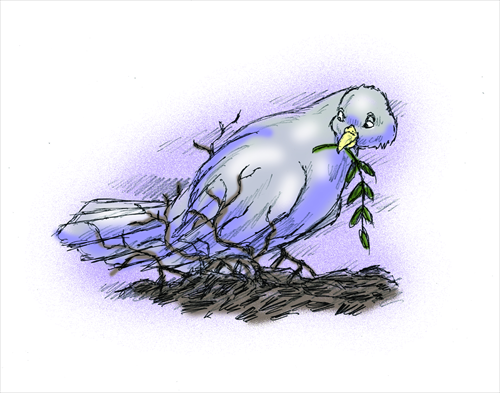HOME >> OP-ED
Tokyo's nuclear call tangles China relations
Source:Global Times Published: 2014-4-8 23:08:01

Illustration: Peter C. Espina/GT
Japan will host the eighth Non-Proliferation and Disarmament Initiative (NPDI) Ministerial Meeting in Hiroshima on Friday and Saturday. It is the first time for the nuclear disarmament meeting to take place in Japan.
According to the Kyoto News Agency, Japan will demand during the meeting that China participate in the US-Russian consultations designed to reduce the number of nuclear warheads and engage in multilateral arms reduction negotiations.
A victim of nuclear weapons itself, Japan has been bitterly aware of their effects for decades since the US dropped atomic bombs on Hiroshima and Nagasaki in August 1945.
And the catastrophic earthquake and tsunami in March 2011 crippled Fukushima nuclear power plant, causing protracted irrevocable damage with nuclear leakage and radiation.
It is notable that Tokyo lodged protests when China exploded its first atomic bomb in 1964. Japan has been following China's nuclear development, and therefore a nuclear-phobic theory has gradually taken shape among the Japanese public opinion, which Prime Minister Shinzo Abe can utilize to hype Beijing's every nuclear-related move.
Japan, which will hold the upcoming NPDI meeting, is planning to pressure China to conduct nuclear disarmament, turn the tide against Beijing, and leave the world an impression that Beijing is now trying to change the existing international architecture with its increasingly assertive military power.
In blaming the Chinese government for lack of transparency in its swiftly rising military expenditure, Abe's cabinet attempts to claim the moral high ground by smearing China and constraining its rise in concerted efforts with some other non-nuclear states.
Nevertheless, it is totally groundless for Japan to ask Beijing to engage in nuclear arms reduction.
To start with, Tokyo is under the US nuclear umbrella, a centerpiece of their bilateral security alliance. With fewer nuclear weapons, China is no rival of the US in nuclear capacity.
Furthermore, Japan could potentially build more than 1,000 nuclear warheads in a very short period of time due to its advanced technology and possession of fissile material.
Right-wing Japanese politicians have never steered clear away from the ambition to develop nuclear capacities.
In 1957, then prime minister Nobusuke Kishi, Abe's grandfather, stated that nuclear weapons were not technically prohibited by Article 9 of the peace constitution.
The Three Non-nuclear Principles of not possessing, not developing and not introducing nuclear weapons into Japan have in actuality never been held that dear. The principles formally adopted by the Diet in 1971 were just formulated under US pressure and the institutional restriction of the constitution.
And in July 2011, then Tokyo governor Shintaro Ishihara said during an interview, "Japan should absolutely possess nuclear weapons," citing China and North Korea as potential threats.
Therefore, it is Japan that has been deepening its nuclear embrace to include weapons.
Tokyo's call on China to join the US and Russia in arms control talks is not only a counterattack against Beijing, which has urged the Japanese government to take a responsible attitude regarding its enriched uranium and weapons-grade plutonium, but also a coverup for Tokyo's own nuclear ambitions.
The Diplomat, an online current affairs magazine based in Tokyo, commented, "For Japan's purposes, including China in the draft statement is probably more of a public relations stunt […] and the bitter public relations war between China and Japan seems to be going nuclear."
The ceaseless row between the two neighbors seems to have gone beyond territorial disputes to the nuclear realm. And the nuclear issue has become another excuse from Abe to constrain Beijing, which is likely to intensify mutual distrust in the already frozen bilateral relations.
Beijing is committed to effectively ensuring the security of all its nuclear materials and facilities by improving technology and emergency response and conducting comprehensive nuclear checks across the country. There is no need for China to respond to Japan's challenge now.
The article was compiled by Global Times reporter Wang Xiaonan, based on an interview with Hu Lingyuan, director of the Center for Japanese Studies, Fudan University. wangxiaonan@globaltimes.com.cn
Posted in: Viewpoint